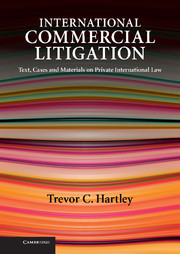Book contents
- Frontmatter
- Contents
- Table of panels
- List of figures
- Preface
- Acknowledgments
- Terminology
- Table of Latin phrases
- List of abbreviations
- Table of cases
- Table of cases (European Court of Justice, numerical order)
- Table of legislative instruments
- PART I STARTING OFF
- PART II JURISDICTION
- 2 Jurisdiction: an analysis
- 3 Jurisdiction under EC law
- 4 EC law: special jurisdiction
- 5 The traditional English rules
- 6 Developments in Canada
- 7 US law: an outline
- 8 Choice-of-court agreements
- 9 Forum non conveniens and antisuit injunctions
- 10 Overlapping jurisdiction in EC law
- 11 Special topics – I
- 12 Special topics – II
- PART III FOREIGN JUDGMENTS
- PART IV PROCEDURE
- PART V CHOICE OF LAW
- PART VI EXTRATERRITORIALITY
- Bibliography
- Index
7 - US law: an outline
from PART II - JURISDICTION
- Frontmatter
- Contents
- Table of panels
- List of figures
- Preface
- Acknowledgments
- Terminology
- Table of Latin phrases
- List of abbreviations
- Table of cases
- Table of cases (European Court of Justice, numerical order)
- Table of legislative instruments
- PART I STARTING OFF
- PART II JURISDICTION
- 2 Jurisdiction: an analysis
- 3 Jurisdiction under EC law
- 4 EC law: special jurisdiction
- 5 The traditional English rules
- 6 Developments in Canada
- 7 US law: an outline
- 8 Choice-of-court agreements
- 9 Forum non conveniens and antisuit injunctions
- 10 Overlapping jurisdiction in EC law
- 11 Special topics – I
- 12 Special topics – II
- PART III FOREIGN JUDGMENTS
- PART IV PROCEDURE
- PART V CHOICE OF LAW
- PART VI EXTRATERRITORIALITY
- Bibliography
- Index
Summary
The US legal system
In this chapter, we consider the basic rules of jurisdiction in the United States. First, however, we must take a look at the US legal system.
As in the case of Canada, the relevant unit – even for the purpose of international jurisdiction – is normally a particular state, not the United States as a whole. For this reason, it is essential to understand the relationship between the United States and the individual states, which is more complicated than in the case of Canada.
As in the case of Canada, governmental authority is divided between the federation (the United States) and the states. Each has its own system of government, made up of legislative, executive and judicial branches. There are state legislatures enacting state laws and the federal legislature (Congress) enacting federal laws. Certain areas of law are largely governed by federal statutes (for example, patents) but many general areas, including contract, tort and property, are largely controlled by state law, though federal legislation may impinge in particular cases.
Each state has a complete court system. Typically, there will be a trial level, an intermediate appeal level and a state supreme court. In addition, there is a complete federal judicial system. The trial courts are called federal district courts. The United States is divided into a number of federal judicial districts, each with its own federal district court. Federal judicial districts may consist of a whole state or part of a state.
- Type
- Chapter
- Information
- International Commercial LitigationText, Cases and Materials on Private International Law, pp. 132 - 162Publisher: Cambridge University PressPrint publication year: 2009



